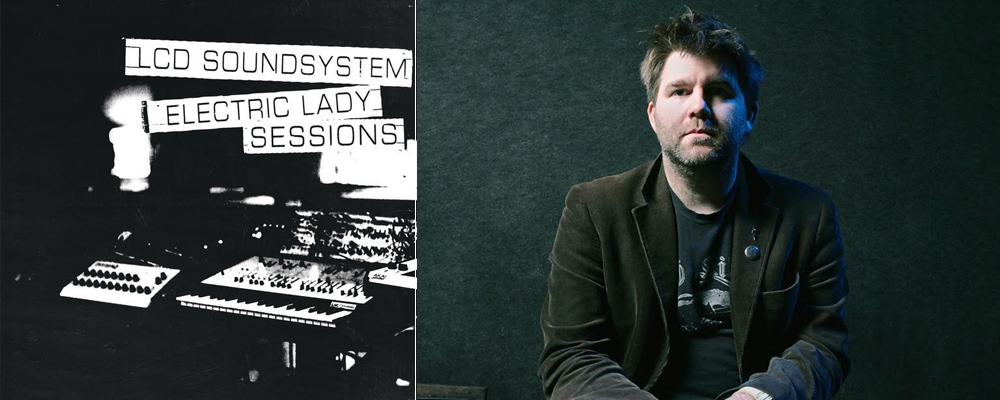LCD Soundsystem Rework Their Songs for the Stage on Live Album ‘Electric Lady Sessions’
Adi Mehta
Dance music today is primarily a producer’s game, well outside the domain of live musicians. Like most of his peers, LCD Soundsystem’s James Murphy has generally taken to his gear and laptop to build beats, one layer at a time, crafting collages of sound that develop into readymade tracks. He also, however, ventures beyond these confines, and arranges his songs to be performed in a live setting. For LCD’s latest project, the touring band set up shop in Jimi Hendrix’s legendary Electric Lady studios in Greenwich Village to record live versions of tracks from their back catalogue, along with a few cover songs. The resulting release, “Electric Lady Sessions,” is a masterful collection of organic reworkings that effectively capture the spirit of the original songs, and revitalize them.
The album begins with an amped-up and magnified cover of The Human League’s “Seconds,” with louder, tighter drums and more prominent, abrasive, synth bass. Murphy captures singer Philip Oakey’s signature vocal inflections. However, Oakey’s voice always had a certain jokey quality that doesn’t make its way into the LCD version. Instead, Murphy bellows in a way that recalls Ian Curtis, and creates a darker, almost dystopian feel that fits well with the heavier arrangement.
Half of the songs included have been lifted from LCD’s last record, 2017’s “American Dream.” First comes the title track, faithfully reproduced, with the only significant difference being, again, a bolder and brighter sound palette. The wobbly bassline from which the song achieves much of its edge is here reproduced in brighter tones that add more discordance to the mix, giving it a thrillingly outré character. “Call the Police,” already a guitar-driven number, lends itself to the live band dynamic. The band stick to the original arrangement, but seem to render it tighter and more forceful. The case is the same for “I Used To,” which is preserved, but somehow performed more compellingly.
Quirky dancefloor banger “Tonite” is slightly sped up to pack more of a punch. The sprightly post punk stylings of “Emotional Haircut” are brought to a new intensity, with the band members feeding of each other’s energy to palpable effect. The track escalates into the record’s heaviest moment, and culminates with Murphy hollering in impassioned punk ferocity over a torrent of distortion. “Oh Baby” is given louder, resonating snares and heavier, growling bass, which allow it to take on a new scale.
Two tracks from 2010’s “This Is Happening” make their way onto the album. “You Wanted a Hit” loses some of its propulsive drive, as the live drums lack the bite of the original sharp snares and handclaps. The reworking trades some groove for greater weight and force, with the band ultimately erupting into a surge of ringing, distorted guitars. “Home” also loses some of its momentum in its new arrangement, but is augmented with new rhythmic layers, and benefits from a free-flowing format that befits the full band treatment. “Get Innocuous” the sole inclusion from 2007’s “The Sound of Silver.”is the most radical reimagining, expanding the song to new dimensions. Unlike the relatively stripped-down live version from 2010’s “London Sessions,” the new take retains the syncopated percussion of the original, and augments it with an expanded drum kit. The true highlight comes near the end, when the band spices things up with a riot of Tito Puente-style, clattering drum soloing, achieving an exhilarating groove.
Murphy and crew also take a stab at Chic’s “I Want Your Love.” More in the tradition of a disco edit than a proper cover, it locks into a rhythm, samples a snippet from the original lyrics, and remains predominantly instrumental until eventually unfolding into the anticipated chorus melody. An all too brief bit of supremely funky bass playing at the very end is a sonic highlight. Another cover, Heaven 17’s “(We Don’t Need) This Fascist Groove Thang” brings the album to a rather zany conclusion. The band capture the almost farcical eighties quirk of the original, but retrofit it with modified synth sounds and a slight punk sensibility.
Even in largely electronic music, there is a certain sensibility only made possible by interactions between live musicians in real time. When players join in concert, and music inhabits their collective consciousness, performance becomes more fluid, and whimsical detours lead to exciting sonic explorations. “Electric Lady Sessions” translates LCD Soundsystem’s songs for the stage in a way that simultaneously recreates all their idiosyncratic detail, and breathes new life into them.
“Electric Lady Sessions” is available Feb. 8 on Apple Music.

